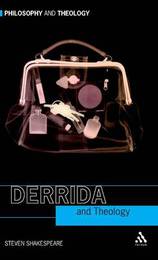
|
Derrida and Theology
Hardback
Main Details
| Title |
Derrida and Theology
|
| Authors and Contributors |
By (author) Rev'd Dr Steven Shakespeare
|
| Series | Philosophy and Theology |
|---|
| Physical Properties |
| Format:Hardback | | Pages:248 | | Dimensions(mm): Height 216,Width 138 |
|
| Category/Genre | Western philosophy from c 1900 to now
Theology |
|---|
| ISBN/Barcode |
9780567186645
|
| Classifications | Dewey:194 |
|---|
| Audience | | Undergraduate | | Postgraduate, Research & Scholarly | |
|---|
|
Publishing Details |
| Publisher |
Bloomsbury Publishing PLC
|
| Imprint |
T.& T.Clark Ltd
|
| Publication Date |
25 June 2009 |
| Publication Country |
United Kingdom
|
Description
Jacques Derrida: a name to strike fear into the hearts of theologians. His ideas have been hugely influential in shaping postmodern philosophy, and its impact has been felt across the humanities from literary studies to architecture. However, he has also been associated with the specters of relativism and nihilism. Some have suggested he undermines any notion of objective truth and stable meaning. Derrida is now increasingly seen as a major contributor to thinking about the complexity of truth, responsibility and witnessing. Theologians and biblical scholars are engaging as never before with Derrida's own deep-rooted reflections on religious themes. From the nature of faith to the name of God, from Messianism to mysticism, from forgiveness to the impossible, he has broken new ground in thinking about religion in our time. His ideas and writing style remain highly complex, however, and can be a forbidding prospect for the uninitiated. This book examines his philosophical approach, his specific work on religious themes, and the ways in which theologians have interpreted, adopted, and disputed them.
Author Biography
Steven Shakespeare is Lecturer in Philosophy at Liverpool Hope University and a Fellow of the Oxford Centre for Animal Ethics. His publications include The Inclusive God (co authored with Hugh Rayment-Pickard, SCM, 2006), Radical Orthodoxy: A Critical Introduction (SPCK, 2007) and Derrida and Theology (T and T Clark, 2009).
Reviews... the book serves its purpose as an introduction ([Shakespeare] should be applauded for the close reading of many primary texts that are usually ignored) and those interested in contemporary continental philosophy of religion will find this work a comprehensive and sensitive guide to Derrida. -- The Expository Times Volume 122, Number 11 'We are familiar with theological responses to Derrida that range from accusations of nihilism to uncritical mimicry. Rarely, however, has such a range of Derrida's writings been so judiciously sifted and evaluated with regard to their significance for theology. Students who have not yet read Derrida will find this a lucid and reliable introduction, whilst those who have already been drawn into the world of Derrida's writing will find much to help them go further. For this is not merely a step-by-step beginners' guide but the fruit of a long-standing and deeply pondered engagement with this most elusive of thinkers. It will be an important addition to any theological library.' - George Pattison, Christ Church, Oxford, UK. -- George Pattison 'This is the most important book on Derrida and religion to come across my desk in a very long time. In page after page of limpid exposition and probing analyses of Derrida's texts, along with an incisive review of the secondary literature, Shakespeare sweeps away decades of misunderstandings of Derrida's project while clearing the way to a deeper appreciation of Derrida's importance for theology. Shakespeare shows great sensitivity both to the requirements of theological thinking and to the delicacies of deconstruction. Following the lead of Derrida's critique of the simplicity of origins, his notion of God the thief, the God of the ruse, gets closer to what Derrida is doing to and for theology than anything else I have read. Subtle, nuanced, judicious and comprehensive--in all a major achievement.' - John D. Caputo, Faculty of Religion, Syracuse University, Syracuse, NY, USA -- John D. Caputo "The book is excellent in many ways, and I would certainly recommend it to undergraduates." The Revd Sam Norton, Church Times, January 29 'His exposition is careful and relentlessly committed to reading Derrida as Derrida intends to be read. This is the book's greatest strength. Shakespeare saves until the end his interaction with the ways in which Derrida has been received by various theologianss. This gives Derrida room to speak. It is a strikingly charitable thing to do. Very few theologians give Derrida this kind of room.' - Beau Pihlaja, University of Texas at El Paso, TX, USA -- Beau Pihlaja * Theological Book Review *
|